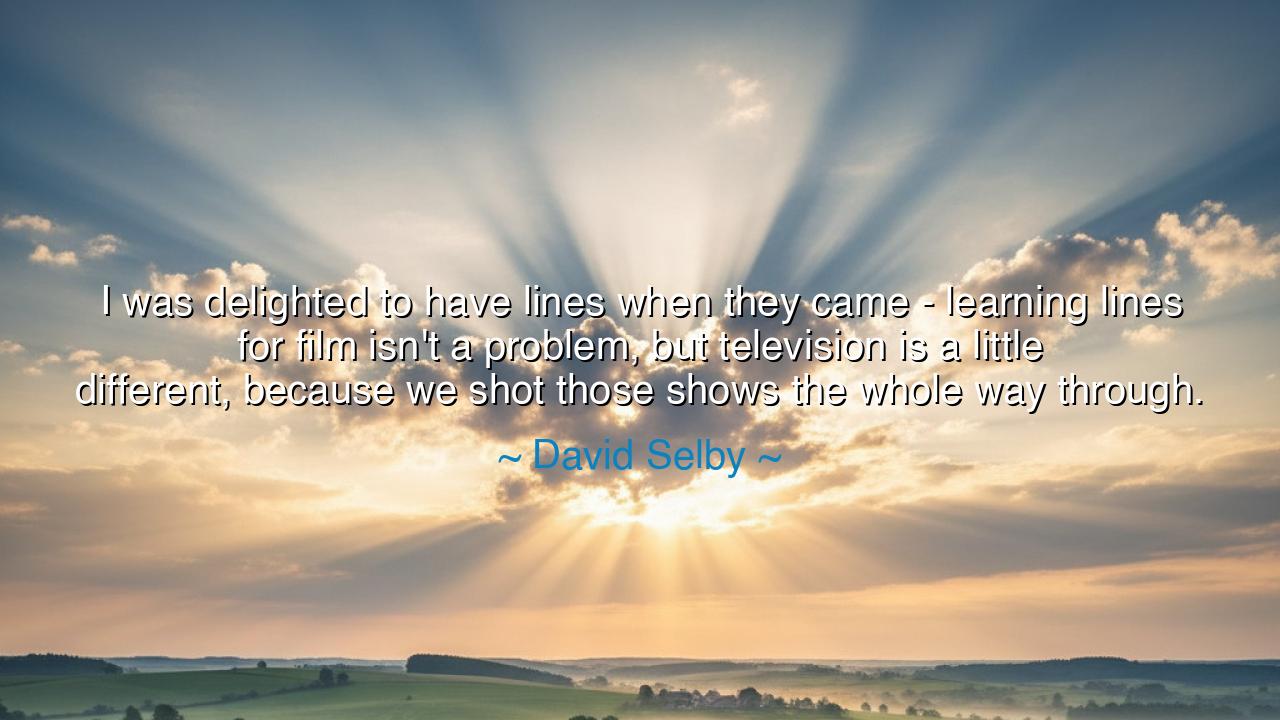
I was delighted to have lines when they came - learning lines for
I was delighted to have lines when they came - learning lines for film isn't a problem, but television is a little different, because we shot those shows the whole way through.






Hear now the words of David Selby, spoken with humility and wisdom: “I was delighted to have lines when they came – learning lines for film isn’t a problem, but television is a little different, because we shot those shows the whole way through.” At first glance, this utterance seems but a reflection upon the craft of acting. Yet within it lies a hidden teaching on patience, discipline, and the endurance of the human spirit. For Selby, known for his labors both on screen and stage, reveals to us the eternal struggle between preparation and performance, between the art of learning and the demand of endurance.
In the world of film, an actor has time. Scenes may be rehearsed, retaken, and sculpted as a sculptor chisels stone. The lines, though many, can be absorbed steadily, like the steady trickle of water into the vessel of the mind. But in television, Selby reminds us, there is no such luxury. The tale must be told all at once, the actor carrying the burden of the story from beginning to end, like a runner bearing the sacred torch across treacherous ground. It is this contrast—the luxury of revision versus the trial of endurance—that gives his words their deeper resonance.
Consider, O listener, the ancient tragedians of Greece, who stood before vast assemblies, their voices amplified by masks, their lines memorized without aid of parchment. They could not pause to repeat, nor stumble and begin again, for the performance was a river flowing in one direction only. To falter was to shatter the spell, to dishonor the Muse. And yet, by discipline, by breath, and by memory’s flame, they carried their roles with majesty. So too does Selby speak of the different demands that each form of storytelling places upon the soul of the actor.
Reflect upon the story of Winston Churchill, whose speeches in the darkest days of war stirred an entire nation to courage. Churchill, though not an actor in the theater, bore the same burden as those of stage and screen. Each speech, delivered whole, could not falter, for the ears of millions depended upon his steady tongue. He would rehearse endlessly, shaping each phrase like a blade, preparing not merely to speak but to endure the weight of speaking through to the end. This echoes Selby’s recognition of the continuous trial demanded by television performance—an unbroken march of will and voice.
Selby’s delight in having lines reveals another truth: gratitude for the opportunity itself. For in the world of performance, lines are not merely words on a page, but gifts of trust, bestowed upon the actor by writer, director, and audience alike. To be given words to speak is to be entrusted with the vessel of story, to carry meaning across the fragile bridge of human attention. And so, even when the burden is heavy, there is joy, for one has been chosen to bear it.
The lesson, beloved hearer, is this: Do not shrink from the tasks that stretch your endurance. Do not despise the challenges that demand you walk the whole path without pause. For though the way may seem harder, though there are no second chances, such trials forge a deeper strength within you. The difference between comfort and trial is the difference between ease and mastery.
What actions, then, should you take? First, cultivate memory and focus, for these are the tools that steady the tongue and mind when no pause is allowed. Second, welcome difficulty, for it sharpens your edge more keenly than ease ever could. Third, approach each responsibility with gratitude, even when it taxes your strength, for to be entrusted with a task is itself a gift.
And remember this always: whether you stand before the camera, before a crowd, or before the silent gaze of your own conscience, life will often demand of you not the luxury of correction but the courage of endurance. Carry your lines, your duties, your words, as Selby carried his—through to the end, without faltering, with delight in the gift of the challenge itself. This is the wisdom hidden in his words, a torch for all who seek mastery over their own performance in the theater of life.






AAdministratorAdministrator
Welcome, honored guests. Please leave a comment, we will respond soon